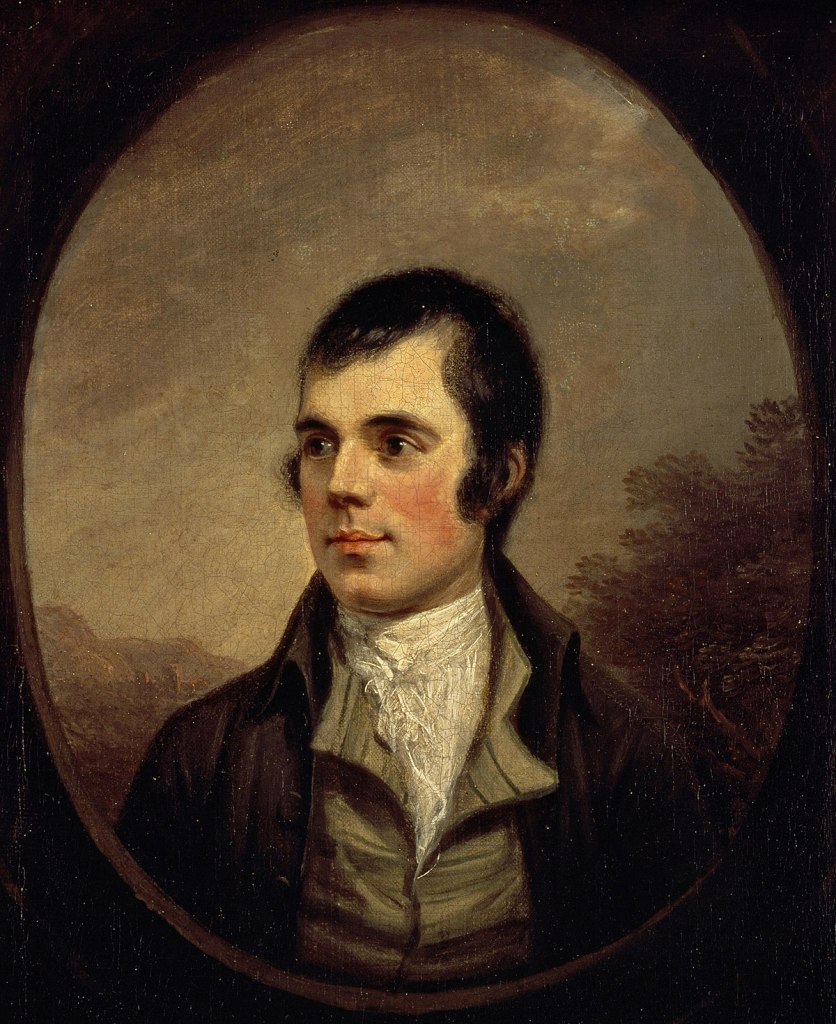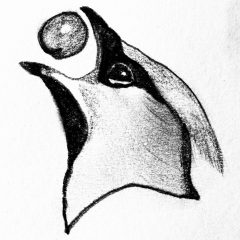
As a farmer’s son from Ayrshire I have some knowledge of the culture and landscape associated with Burns’ work. Alloway Kirk is a familiar landmark and my brother had a farm on the banks of the Doon. We have a tenuous connection to the man himself. He is said to have had negotiations regarding working in Jamaica at the home of Patrick Douglas whose family owned a plantation there. They lived at Garrallan House, Cumnock, part of the estate our family owned until recently. Patrick Douglas of Garrallan was present at the first ever Burns Supper on 21st July 1801 held in Burns’ Cottage. Of the 9 guests present only Hamilton Paul, who organised it, had not met Burns.
In Ayrshire, Burns Suppers are approached with no little gravity and reverence. When I moved to Edinburgh to attend university I was surprised at the levity associated with Burns Suppers on the East Coast. 10 years ago I was asked to prepare something for a Supper at a friend’s house. Knowing he would have some fairly able guests contributing to it I took my usual approach to public speaking and wrote some doggerel. At the time, Jeremy Paxman was getting flak for saying he didn’t like Burns, and looking at the annual parade of mediocrity on the Scottish media around January 25th one could hardly blame him for feeling negative about it. However, such tastelessness is not the fault of Burns’ work.
A few facts about Burns’ life might be helpful to the uninitiated. He was of course a farmer, well educated through his father’s efforts, and embarked on ‘poesy’ and womanising at a precocious age. Initially he was not successful and had to continue with the day job whether he liked it or not. The plan to escape Ayrshire and his romantic entanglements by going to work on the plantation in Jamaica was abandoned when his first book of poems the Kilmarnock Edition, made him an overnight success. He also abandoned ‘Highland Mary’, left waiting on the quayside, who he had intended to take with him. She then succumbed to a fever. After a three-day ride to Edinburgh he was feted by high society and embarked on an ultimately unsuccessful romantic correspondence with Agnes McLehose using fancy noms de plume. Meanwhile he made Mrs McLehose’s poor maidservant pregnant.
He returned to farming but remained financially embarrassed. His poor health, probably due to rheumatic heart disease, was an increasing handicap to hard physical labour and he took a job as an exciseman (or gauger) to support his family. The prescription of seawater bathing did not help matters. As an exciseman he was compelled to join the Royal Dumfries Volunteers. Aware that his life was coming to an end, he requested that the Volunteers should not honour him at his funeral saying, ‘Don’t let the awkward squad fire over me’. They did so nevertheless.
His wife Jean Armour gave birth to his last child in an upper room of his house in Dumfries as his coffin, filled with wild flowers, was carried past below. He was 37 years old.
The Immortal Robert Burns
His place is on Parnassus Mount
But English men contest it
The Ayrshire farmer’s verses count
Though Paxman does detest it
(Sam Johnson’s more to Jerry’s taste
They share Albanic grudges
Sam’s self-description points their place-
They’re both just “harmless drudges”)
Though born to toil in sodden field
His passions overwhelmed him
Amang the stooks the lassies yield
The cutty stool will learn him
The churchmen sought to dowse his fire
And lecture him on morals
Our Robin ducked the elders’ ire
And sought poetic laurels
Upon the muse his die was cast
Scholastic style or rural
The words came flowing free and fast
Though life was hard and frugal
But nothing could he wrought that sold
To free him from his labour
The sullen land lay black and cold
With penury its neighbour
He brushed the Carrick soil away
And looked towards Jamaica
Sweet Mary waited on the quay
The ship would never take her.
The trusting Highland Lassie pines
While the Poet woos the nation
From Scotia’s Seat he reads the lines;
“Edina’s new sensation”
Three days upon the eastward road
Half-dead on his arrival
The City hailed her ploughman God
He had no match nor rival
The salons put him to the test
He won each verbal combat
The Masons clasped him to their breast
His brithers true – for a’that
Part erudite sophisticate
Part drunken rustic lover
He’d scant regard for etiquette
As Nancy did discover
She rued the floral path she chose
Clarinda spurned Sylvander
It’s back to Agnes McLehose
And Robert Burns the farmer
The drink and Toffs went to his head
He raped the Sabine women
He claimed he had been badly led
By passion he was driven
Despite the blaze of worldly fame
His poetry attained him
There was no living in the game
The writing ne’er sustained him
So to Dumfriesshire’s green terrain
Where rain and clay reclaimed him
The labour wracked his sickly frame
And in the end it tamed him
While words came freely to his quill
Hard toil would never free him
And so to save his family ill
An excise man he’d be then
But Death soon claimed the Gauger man
Whose heart, by now, was failing
The quack prescribed Seawater baths
His mortal span curtailing
That day Jean bore a child, his last
The Awkward Squad fired o’er him
Below her room the coffin passed
Her heart held none before him
It’s surely worth the work and will
To do a little learning
We need no other voice to fill
A Nation’s deepest yearning
Of mice and lice, and dugs and birds
Society’s divisions
Of trysting’s sweet and secret words
And Tam o’ Shanter’s visions
The TV offers up its rot
A thousand tasteless turns
We should disown the bloody lot
The Star is Robbie Burns
AJM Stevenson
January 2010
